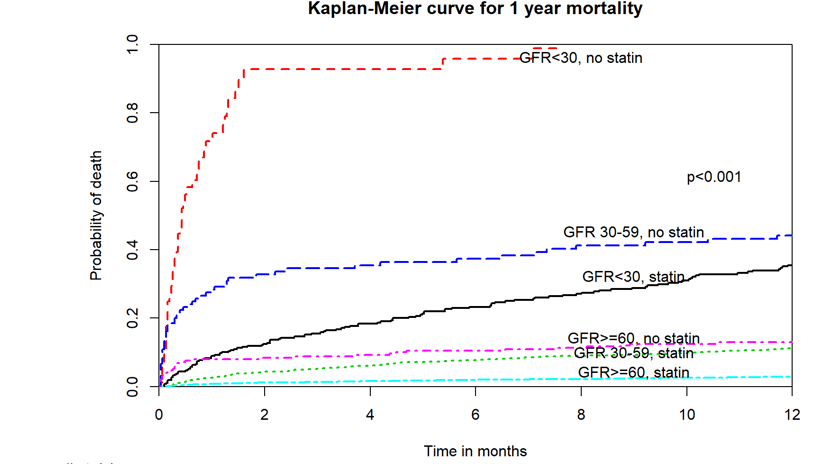
Statins Therapy Among Chronic Kidney Disease Patients Presenting with Acute Coronary Syndrome
2Cardiology Department, Rabin Medical Center and the Sackler Faculty of Medicine, Tel Aviv University
3on behalf of the ACSIS, Investigators
Background: Statin`s beneficial effect has been well validated for both primary and secondary prevention of cardiovascular disease. Still, they are underused among patients with chronic kidney disease (CKD).
Objective: We aim to investigate the impact of statin therapy across a wide spectrum of CKD patients who presented with acute coronary syndrome (ACS).
Design and Setting: We included all patients with ACS enrolled in the Acute Coronary Syndrome Israeli Survey (ACSIS) between the years 2006-2016. Patients were divided into 3 groups according to their renal function based on estimated glomerular filtration rate )eGFR) calculation at admission (MDRD formula) - eGFR2, eGFR 30-59 ml/min/1.73 m2 and eGFR>60 ml/min/1.73 m2 .
Main Outcome: Primary outcome includes: in-hospital, 30-day, and 1-year major adverse cardiovascular events (MACE). Cox regression analysis to assess the independent prognostic effect of statin among CKD patients with ACS.
Results: 8945 consecutive ACS patients were included in our analysis. eGFR: 2 (n=525, 6%), 30-59 ml/min/1.73 m2 (n=1919, 21%), ≥60 (n=6501, 73%). Statin prescription on hospital discharge was negatively associated with eGFR. ]eGFR>60 ml/min/1.73 m2- 95%, eGFR 30-59 ml/min/1.73 m2-90%, eGFR2-78% (p
Conclusion: Statin`s beneficial effect is maintained among CKD patients. These patients presenting with ACS should be treated with statins regardless of their eGFR.
Powered by Eventact EMS